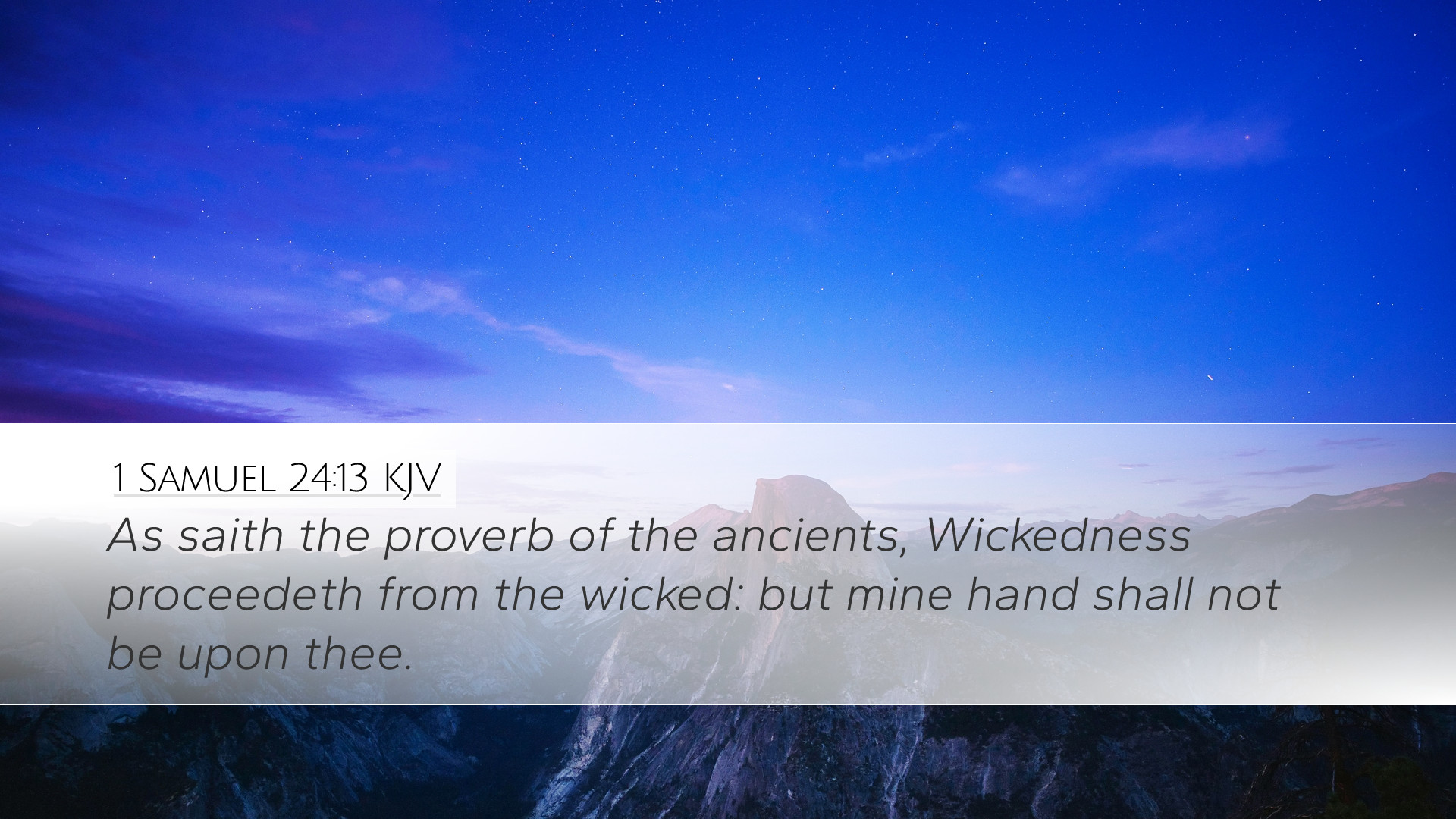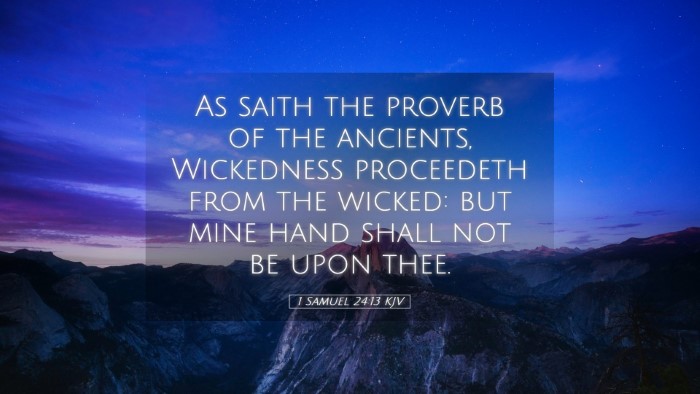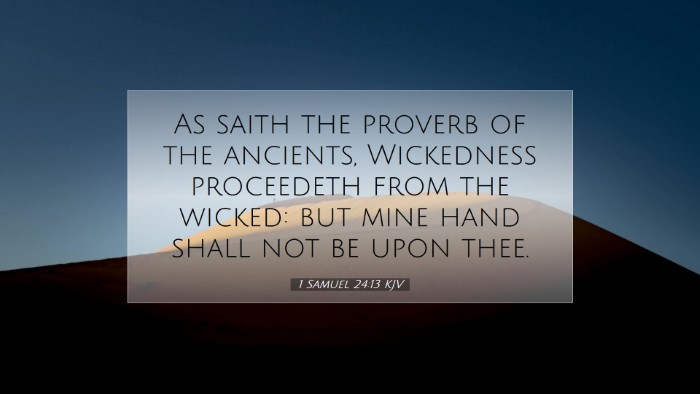1 Samuel 24:13 Commentary
Verse: "As saith the proverb of the ancients, Wickedness proceedeth from the wicked: but mine hand shall not be upon thee."
Introduction
The narrative in 1 Samuel 24 is a poignant moment illustrating deep themes of mercy, justice, and moral integrity. This particular verse encapsulates David's exalted moral standing in contrast to his adversary, Saul. Here, David quotes a well-known proverb to underscore a fundamental truth about human behavior and divine justice.
Insights From Public Domain Commentaries
Matthew Henry's Commentary
Henry emphasizes the moral integrity of David, noting that he refrains from harming Saul despite being pursued unjustly. He observes that the proverb quoted by David reflects a universal truth—that wicked actions stem from wicked individuals. David’s refusal to take revenge highlights his commitment to righteousness and a deep sense of respect for God's anointed king.
Henry elaborates on the significance of authority and the reverence owed to it, even when that authority acts unjustly. David’s restraint illustrates a profound understanding of the divine order, suggesting that it is not his place to enact judgment. This virtue is commendable and serves as a lesson for all leaders and individuals. Henry notes, "Where there is a wicked person, there we may expect wickedness, but the godly must not stoop to their level.”
Albert Barnes' Commentary
Barnes reinforces the idea that David’s quotation of the proverb serves as a reflection of his awareness of human nature. He asserts that the proverb could denote a larger understanding of the character of Saul and his actions. Barnes comments that David acknowledges Saul’s role as the king, but he does not condone Saul’s conduct, which is driven by jealousy and fear.
Barnes further highlights the notion that true nobility is revealed in restraint and compassion. He supports this by explaining that David is demonstrating his trust in God’s justice rather than seeking personal vengeance. The statement, “but mine hand shall not be upon thee,” indicates David's commitment to leave judgment in God's hands. It also shows a deep respect for God's providence even in turbulent times.
Adam Clarke's Commentary
Clarke notes the cultural and spiritual dimensions behind this verse, detailing that the proverb referenced by David speaks to the nature of sin. He contends that David’s decision to refrain from harming Saul symbolizes a broader theological truth that divine retribution will ultimately address the wickedness inherent in those who oppress the righteous.
According to Clarke, the phrase "wickedness proceedeth from the wicked" can be interpreted in the context of divine sovereignty, conveying that God allows it to be so for a time. Clarke underscores that David’s act of mercy can be seen as a reflection of God’s mercy—one that contrasts sharply with the murderous plot of Saul against him. This highlights a key principle of biblical teaching: that the righteous must not engage in the immoral practices of the wicked but rather act out of faith and principle.
Theological Reflection
This verse offers a rich avenue for theological reflection, touching on various key themes such as:
- Moral Authority: The distinction between being a ruler and grasping power—David acknowledges Saul’s title but resists unjust oppression.
- Faith in Divine Justice: An affirmation that God’s justice prevails over human injustices.
- Human Nature and Sin: Understanding of the inherent wickedness of humanity and the calls to respond with integrity.
- Example for Discernment: Leaders today are reminded to be cautious of the influence of surroundings and to maintain integrity.
Application for Pastors, Students, and Theologians
For pastors, this verse serves as a reminder to cultivate a spirit of mercy and integrity within their congregations. The call to not perpetuate cycles of revenge and conflict is vital in pastoral care and community leadership. It inspires a model for responding to criticism and injustice with grace.
Students of the Bible can glean from David’s choices the importance of understanding Scripture contextually while also applying its teachings to contemporary life. Recognizing the human capacity for wickedness calls for a commitment to ethical living grounded in biblical principles.
For theologians, the exploration of this text involves a deeper analysis of how the character of God contrasts with fallen humanity. It invites discussions on the nature of sin, authority, and the demonstration of God’s providence in complex personal and communal relationships.
Conclusion
1 Samuel 24:13 delivers a profound message about the nature of wickedness, divine justice, and personal integrity. The insights offered from the commentaries reflect a timeless truth that can guide the lives of believers through the ages. David's exemplary behavior serves not only as an inspiration but also as a challenge to all who seek to follow in his footsteps by embodying mercy and righteousness, thereby reflecting the character of God amidst a world of conflict and strife.


